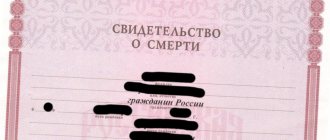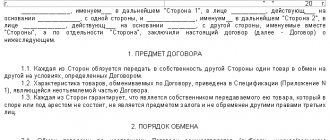The concept of an agreement for the exchange of shares of an apartment
Peculiarities of registration between close relatives and with a minor
The need to exchange movable or immovable property appears quite often in our lives. This is convenient, since you do not need to draw up a purchase and sale agreement and pay a large tax. As for the exchange of shares of an apartment between close relatives, there are a number of nuances and features that we will consider in the article. We also focus on situations where a transaction is concluded with the participation of minors.
Barter agreement: concept
An exchange agreement is an act that confirms the completion of a bilateral transaction on the basis of legislation. Since an agreement for the exchange of an apartment between close relatives assumes that the owner of a share of real estate and those who want to receive this share in exchange for something are both sellers and buyers, rights and obligations arise for the two parties.
Today, an exchange agreement between close relatives is very popular, as it provides for more favorable taxation. When selling an apartment, a tax of 13% of its appraised value is paid by each party, and in the case of me - a one-time tax.
Tax on the exchange of privatized real estate
According to Art. 217 of the Tax Code of the Russian Federation (clause 17.1), a transaction related to the exchange of housing that has been owned for more than 3 years is not subject to taxation . It does not matter how the apartment became the property of the current owner. If it belongs to the owner for less than 3 years, then the tax on income received from the exchange is 13% of the value of the exchanged property. But the legislation also provides for the following: if the price of the apartment being alienated does not exceed 1,000,000 rubles, then such a transaction is exempt from tax. Thus, even if you have owned a home for less than 3 years, but its cost is no more than RUB 1,000,000, you do not need to pay tax. At the same time, when exchanging real estate, the cost of which, for example, is 5,000,000 rubles, the tax amount is calculated as follows: 5,000,000 rubles. minus 1,000,000 rub. (amount that is exempt from taxation) = 4,000,000 rubles. - this is the difference from which the 13% tax will be calculated.
The legislative framework
There is no separate law that would completely regulate this procedure, but there are a number of articles in different legislative acts.
- Article 567 of the Civil Code of the Russian Federation states that each party undertakes the obligation to place one product at the disposal of the other party. Each party is recognized as both a seller, obliging to sell, and a buyer, obliging to accept.
- Article 31 of the Civil Code of the Russian Federation. Explains the exchange procedure: if the exchanged property has the same value, the agreement is considered equal, if different, it is unequal and involves additional payment by one of the parties. The transaction is carried out only with real estate objects; it is impossible to exchange a share of an apartment for money, this will already be a purchase and sale agreement.
- Information letter dated September 24, 2002, No. 69. Explains the nuances regarding the number and names of objects subject to exchange.
Practice shows that the presence of many nuances that usually arise during such agreements requires recourse to real contracts already enshrined in court. You can find information on the official website of the district court.
Exchange of shares
This is an excellent option if you need to resolve disputes related to the place of residence of spouses and children. Difficulties arise in any case. It doesn’t matter whether we are talking about allocated or unallocated shares.
Let’s assume an exchange of an allocated share, for example, 1/3 of an apartment. But unallocated shares cannot participate in such procedures. Even an appeal to the judiciary will not change this situation.
Kinship exchange is beneficial for those who want to move away and free themselves from other family members. Such procedures are often carried out between parents and children who have reached the age of majority.
But this option is also popular among those who, on the contrary, seek to unite everyone with a common area. Then you can sell all the real estate you own and buy one large house in return.
But buying a personal home is still a more suitable option, which carries fewer risks compared to exchanging. Difficulties can only be avoided if both parties are confident that all rules and nuances will be followed.
About the advantages of exchanging apartments, watch this video:
Advantages of drawing up an exchange agreement
The main advantage of the deal is reduced tax. After all, during the purchase and sale, each party pays 13% mandatory tax on the transaction. An exchange agreement between relatives involves a one-time payment of tax, which significantly saves the budget of each party.
The second advantage is a simplified procedure for establishing a new ownership right, which takes much less time to complete.
The third advantage is the functionality of the act itself. There is no official structure of the contract; the parties can specify in it all the nuances for maximum benefit - from additional payments to responsibilities.
Form for drawing up an agreement for the exchange of shares of an apartment
The exchange agreement is drawn up on a white sheet of A4 paper in printed or written form. The sheet should be clean, smooth, not wrinkled. You need to use black or blue ink; in the case of a printed version, standard font and text size, without indents, additional characters or color highlights. The document is notarized, a specialist checks the correctness of the agreement from a legal point of view, and also finds out all the subtleties of the exchange, for example, to what extent the parties’ share is equivalent.
Standard information about the exchange agreement:
- passport details of the parties involved in the agreement;
- an accurate description of the objects of exchange;
- the amount of the difference in the cost of objects, if the contract provides for it;
- the procedure for carrying out the exchange procedure itself is indicated: the sequence of releasing square meters, extract, registration, etc.;
- special conditions, life situations, force majeure circumstances (if this happens) are listed;
- responsibility of the parties for fulfilling the terms of the agreement;
- actions in the event of force majeure, etc.
The structure looks like this: title - date and place of preparation - names of the parties - subject of the agreement - exchange procedure - responsibility of the parties - special provisions - conclusions.
The more detailed the exchange agreement is drawn up, the fewer problems and nuances will arise after its registration, in practice. All data on the share of real estate must be entered into the act: size, location, cadastral number, who it is registered with, etc.
Registration procedure
The drawn up agreement for the exchange of shares in apartments between relatives is not yet a final document authorizing the transaction. Participants must simultaneously contact Rosreestr and submit applications (a sample is offered by the institution). The registrar, along with the application, accepts a receipt for payment of the state fee. 30 days are given to verify the act. If any discrepancies or questions arise, the contract may be referred to the court for review.
Situations when a transaction is invalidated
There are a number of circumstances under which an exchange may be declared invalid by a court:
- A deliberately false transaction with the aim of concealing income.
- Lack of permission from the guardianship and trusteeship authorities.
- Participation of an incapacitated person or an elderly person.
- The emergence of new circumstances.
Lawyer, partner at Berkshire Advisory Group Sergei Kopeikin answers:
An apartment received under a gift agreement must be registered as the property of the donee. Consequently, being the sole owner, the owner has the right, without the consent of the spouse, to make any transactions in his own name, including barter. With this action, one property (in the person of one owner) is replaced with another property (also in the person of one owner, that is, the donee).
In this case, there is no and cannot be a share of the spouse, therefore, in the event of a divorce, they will not have the rights to a share in this apartment. However, when dividing property, the spouse of the owner has the opportunity and right to go to court to demand the division of this apartment and the allocation of his/her share. Legislatively, he/she is given such a right, and sometimes such appeals happen, although the case is undoubtedly a losing one: the court’s decision will always be in favor of the sole owner who received the apartment under a gift agreement and exchanged it.
5 main facts about apartment donation agreements
Donating real estate in 5 questions and answers
Features and nuances
If you want to carry out the procedure for exchanging shares of apartments, you need to obtain the consent of the remaining owners. It is important to find out in advance how commensurate your share is with the other one offered for exchange. If not, find out the amount of the surcharge. To avoid paying tax, you can register a gift between relatives.
During the process, many nuances can arise. That is why it is important to involve a competent notary in the procedure, who knows all the “pitfalls” in advance and will be able to initially draw up a document that is correct, from a legal point of view. Contact our notary office to protect yourself from unequal transactions and fraud. Ivanov Boris Sergeevich is an experienced specialist who will help you draw up an exchange agreement quickly, legally and on the most favorable terms for you.
Treat your share of property responsibly, because, sadly, the world is full of people who want to deceive you.
Trust not the words of relatives, but the recommendations of an independent specialist - a notary! Make an appointment
Special cases of related exchange of apartments
Difficulties in the exchange procedure and its registration arise as a result of differences in the forms of ownership of the exchanged housing . Not only may it not be privatized, but the exchange may only take place on a small portion of the residential premises.
We will tell you below how to arrange an apartment exchange in such situations.
How to make a related exchange of privatized apartments?
Privatized apartments are apartments, the ownership of which is registered with their owners through the housing privatization procedure.
Obviously, in this case there cannot be any particular difficulties in completing the transaction. These are, so to speak, ideal exchange conditions, when both apartments belong to their owners as property rights.
In this case, for the exchange you only need to conclude an exchange agreement, sign it by the parties to the transaction and contact the branch of the registration chamber or the MFC to re-register the rights to the new housing.
In a similar way, apartments are exchanged between citizens who received them not through the privatization procedure, but by inheritance, purchase or other legal means.
If one of the apartments is privatized and the other is not, it is best to carry out the privatization procedure first. To do this, you need to submit a corresponding application to local authorities.
How to exchange social rental housing?
It is impossible to sell those apartments that belong to the state and not to a private person, but which the latter use under a social tenancy agreement. But the law allows them to be exchanged.
Citizens who own public housing on the basis of a social tenancy agreement have the right to exchange their housing for the same, even in other regions of the country.
To complete the transaction you need:
- Conclude an exchange agreement;
- Submit an application to the municipality, attaching a copy of the exchange agreement;
- Receive a warrant from the municipality within 10 days certifying the right of exchange and register your residence.











